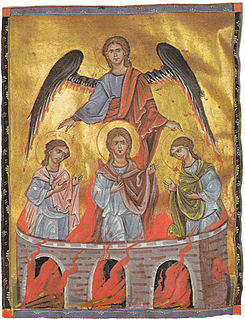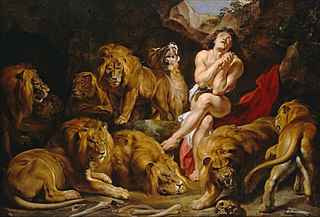 W
WDaniel 1 tells how Daniel and his three companions were among captives taken by Nebuchadnezzar II from Jerusalem to Babylon to be trained in Babylonian wisdom. There they refused to take food and wine from the king and were given knowledge and insight into dreams and visions by God, and at the end of their training they proved ten times better than all the magicians and enchanters in the kingdom.
 W
WDaniel 2 tells how Daniel related and interpreted a dream of Nebuchadnezzar II, king of Babylon. In his night dream, the king saw a gigantic statue made of four metals, from its head of gold to its feet of mingled iron and clay; as he watched, a stone "not cut by human hands" destroyed the statue and became a mountain filling the whole world. Daniel explained to the king that the statue represented four successive kingdoms beginning with Babylon, while the stone and mountain signified a kingdom established by God which would never be destroyed nor given to another people. Nebuchadnezzar then acknowledges the supremacy of Daniel's God and raises him to high office in Babylon.
 W
WShadrach, Meshach, and Abednego are figures from the biblical Book of Daniel, primarily chapter 3. In the narrative, three Hebrew men are thrown into a fiery furnace by Nebuchadnezzar II, King of Babylon, when they refuse to bow down to the king's image; the three are preserved from harm and the king sees four men walking in the flames, "the fourth ... like a son of God". They are first mentioned in Daniel 1, where alongside Daniel they are brought to Babylon to study Chaldean language and literature with a view to them serving at the King's court, and their Hebrew names are replaced with Chaldean or Babylonian names.
 W
WDaniel 4, the fourth chapter of the Bible's Book of Daniel, is presented in the form of a letter from king Nebuchadnezzar II in which he learns a lesson of God's sovereignty, "who is able to bring low those who walk in pride". Nebuchadnezzar dreams of a great tree that shelters the whole world, but an angelic "watcher" appears and decrees that the tree must be cut down and that for seven years he will have his human mind taken away and will eat grass like an ox. This comes to pass, and at the end of his punishment, Nebuchadnezzar praises God. Daniel's role is to interpret the dream for the king.
 W
WBelshazzar's feast, or the story of the writing on the wall, tells how Belshazzar holds a great feast and drinks from the vessels that had been looted in the destruction of the First Temple. A hand appears and writes on the wall. The terrified Belshazzar calls for his wise men, but they are unable to read the writing. The queen advises him to send for Daniel, renowned for his wisdom. Daniel reminds Belshazzar that his father Nebuchadnezzar, when he became arrogant, was thrown down until he learned that God has sovereignty over the kingdom of men. Belshazzar had likewise blasphemed God, and so God sent this hand. Daniel then reads the message and interprets it: God has numbered Belshazzar's days, he has been weighed and found wanting, and his kingdom will be given to the Medes and the Persians.That very night Belshazzar the Chaldean (Babylonian) king was killed, and Darius the Mede received the kingdom.
 W
WDaniel in the lions' den tells of how the biblical Daniel is saved from lions by the God of Israel "because I was found blameless before him". It parallels and complements chapter 3, the story of Shadrach, Meshach, and Abednego: each begins with the jealousy of non-Jews towards successful Jews and an imperial edict requiring them to compromise their religion, and concludes with divine deliverance and a king who confesses the greatness of the God of the Jews and issues an edict of royal protection. The tales making up chapters 1–6 of Daniel date no earlier than the Hellenistic period and were probably originally independent, but were collected in the mid-2nd century BC and expanded shortly afterwards with the visions of the later chapters to produce the modern book.
 W
WBelshazzar's feast, or the story of the writing on the wall, tells how Belshazzar holds a great feast and drinks from the vessels that had been looted in the destruction of the First Temple. A hand appears and writes on the wall. The terrified Belshazzar calls for his wise men, but they are unable to read the writing. The queen advises him to send for Daniel, renowned for his wisdom. Daniel reminds Belshazzar that his father Nebuchadnezzar, when he became arrogant, was thrown down until he learned that God has sovereignty over the kingdom of men. Belshazzar had likewise blasphemed God, and so God sent this hand. Daniel then reads the message and interprets it: God has numbered Belshazzar's days, he has been weighed and found wanting, and his kingdom will be given to the Medes and the Persians.That very night Belshazzar the Chaldean (Babylonian) king was killed, and Darius the Mede received the kingdom.
 W
WThe "finger of God" is a phrase used in the Bible. In Exodus 8:16–20 it is used during the plagues of Egypt by the Egyptian magicians. In Exodus 31:18 and Deuteronomy 9:10 it refers to the method by which the Ten Commandments were written on tablets of stone that were brought down from biblical Mount Sinai by Moses.
 W
WDaniel in the lions' den tells of how the biblical Daniel is saved from lions by the God of Israel "because I was found blameless before him". It parallels and complements chapter 3, the story of Shadrach, Meshach, and Abednego: each begins with the jealousy of non-Jews towards successful Jews and an imperial edict requiring them to compromise their religion, and concludes with divine deliverance and a king who confesses the greatness of the God of the Jews and issues an edict of royal protection. The tales making up chapters 1–6 of Daniel date no earlier than the Hellenistic period and were probably originally independent, but were collected in the mid-2nd century BC and expanded shortly afterwards with the visions of the later chapters to produce the modern book.